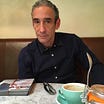Synthetic Creativity Vs Organic Originality
Critical theorist Doug Rushkoff Joins "Breaking the AI Barrier"
I’m excited to share that Douglas Rushkoff will be joining our upcoming course, "Breaking the AI Barrier", hosted by Liminal Media. Rushkoff has long been a rare voice of clarity in the fog of technocapitalism. He is a media theorist and cultural critic whose books include Survival of the Richest, Throwing Rocks at the Google Bus, Program or Be Programmed, and Cyberia, among others. His work delves into how digital technologies impact our lives and societies, offering solutions and hopeful possibilities.
“I think there can be a positive sort of futurism even in a presentist society,” he has proposed. “But I think it’s a kind of futurism that envisions augmenting human ability and intellect rather than creating some artificial machine intelligence that displaces us.” Rushkoff’s podcast, Team Human, explores progessive possibilities for social and technogical evolution from an ethical humanist perspective.
We are offering a 30% discount this week to celebrate my birthday. Access that here:
In “Artificial Creativity”, a recent essay on Substack, he argues that generative AI acts as a mirror that shows us where our own creative output has become mechanical or clichéd. By replicating the “averaged” version of a creative act, AI makes the inauthenticity and mechanical more obvious. This should act as a challenge that compels human creators to dig deeper for the original spark or mot juste. For creative people, generative AI can help us see where we lapse into banality and repetition. Our task remains to craft something more vital, more original, than what even the most sophisticated machine can express. He writes:
As McLuhan colleague John Culkin once said, we create a tool and from then on, it creates us. The tools we use in the arts change our aesthetics and our experience. Early industrial age media technologies like the printing press changed the way we understood literature. The highly personalized handwritten manuscript became the easily reproducible printed book. The flow of handwriting gave way to the mechanized units of typesetting. Every M would be the same, no matter its context.
Not coincidentally, that same wave of innovation also brought us the keyboard instruments. Again, each note - say an Ab - could only be tuned the same way, no matter which key the instrument was supposed to play. As any string musician knows, an Ab is not the same note when it is functioning as a G# in the key of E. Keyboard instruments required the invention of what is known as “equal temperament” - a compromise of fine tuning for mechanical keyboard instruments to approximate the notes of the music score. In some ways, that can be understood as the precursor to MIDI and digital music, which depend on these discrete, exact metrics in order to execute a song.
As I’ve written elsewhere… this printing press moment is also when we got hourly wages and a clock on the highest tower of the town. Human beings were to be understood as units of labor, and as interchangeable as typeset letters or keyboard notes. And that has come to define the quality of every industry, music included. Think of the recording industry, with the artists behind glass, responding to a “producer” operating the board in a control room. The competitive advantage of a recording, in the most pop of pop music, ended up having less to do with the artist than the producer.
AI may just bring this industrialization to its logical extreme. If artists and producers are both replaced by AI’s, how does anyone distinguish themselves? If all the book publishers, music makers, art producers, and film studios are using the same AI technologies to create their products, how does anyone gain a competitive advantage? They can’t. The only way to win is to become the only player. The commodification of its product requires a business to become a monopoly.
Breaking the AI Barrier (July 6–30) examines the philosophical questions posed by AI and explores practical approaches for how you can leverage it for personal and societal benefit.
I hope you’ll join us! The live seminar meets Sundays and Wednesdays. All sessions will be recorded for replay, and we will also have a community network hub for sharing and co-creating.









Happy birthday!
as a scupturer and painter my sculpures and drawings can be copied by ai and that feels horrible